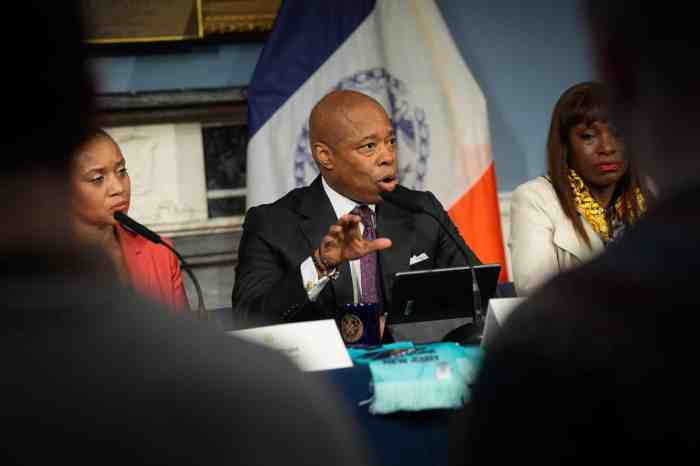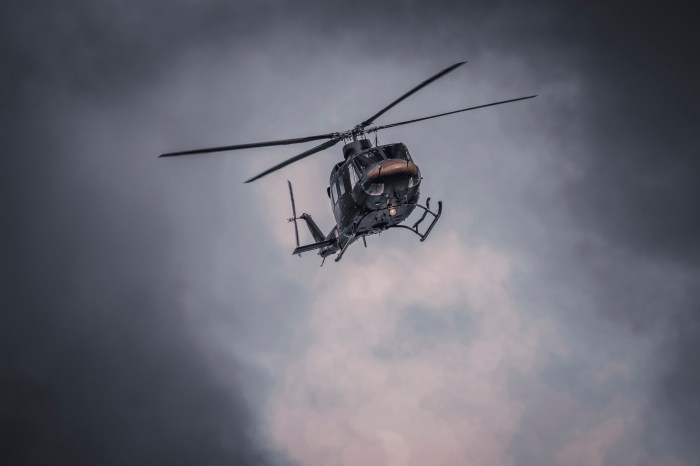BY HELAINA N. HOVITZ | In August of 1963, for the first time in history, armed soldiers stationed themselves on city sidewalks during the March on Washington, led by Dr. Martin Luther King, Jr.
In September of 2001, Lower Manhattan saw them by the truckload, and they were back again exactly ten years later in September 2011.
They are still patrolling Zuccotti Park and city sidewalks nationwide to this day.
On the heels of the Occupy Wall Street Movement, Bernice King, daughter of the late Dr. Martin Luther King, Jr., spoke on February 1 at Pace University and discussed the importance of social justice and the power of activism in the United States.
Dr. King was most vividly remembered as a human rights leader who fought, among many things, against economic inequality. There was nothing elite, he said, about wrongheaded beliefs. He examined the world as it actually was and saw clearly that “injustice anywhere is a threat to justice everywhere.” He tried to warn us about the looming danger of a culture rapidly deteriorating, of the rise of greed, materialism, elitism, and selfishness. At some point, he said, we would be at the ruin of America.
We’re well on our way down that steady decline, deep into housing, poverty, and healthcare crises while economic and political systems are collapsing all around us.
At first, Occupy Wall Street seemed reminiscent of Dr. King’s quest, after having secured equal voting rights, to bring attention to the unequal distribution of wealth in this nation. Shortly after President Johnson declared a “war on poverty” in 1964, another war — Vietnam — threatened its emphasis, and financial resources were diverted to its propagation.
Even then, Americans suffered from lack of fair and equal economic opportunities and a severe sense of hopelessness.
Ten years after our nations’ longest war was underway, we found ourselves in the same place—perhaps, arguably, even worse off.
What started out as a movement with a somewhat clear focus, soon became a circus of varying demands and protests; yet people are still donating to this “movement,” and protestors continue to make headlines by squaring off with police.
The official Occupy Wall Street website offers some insight into the common principles they are fighting for: participatory democracy, personal and collective responsibility, redefinition of labor values, and a new socio-political and economic alternative that offers greater possibility of equality.
Similarly, Dr. King urged us to spend our time in pursuit of justice and freedom. But is our time most wisely spent camping out in parks or urinating in the streets? This does not a movement make.
Regardless, the Occupy “movement” caught on like wildfire and spread throughout the nation. Yet these protests, unsurprisingly, have not caused any tangible changes in the system.
Luckily, some students are becoming inspired to pursue careers that will allow them to one day be in a position to create change. Pace requires them to take courses in civil justice, and asks them to give up their spring break to focus on helping the hungry and homeless of New York—which many of them do.
“My father studied things he thought would help in his quest for how to change the world,” King relayed to her young audience. “We need students to become leaders who make decisions and policies that respect the dignity of personhood, not profit margin. Corporations need to make money, but not at the cost of damaging people.”
On the moral end of the spectrum, she continued, reality television shows have replaced sitcoms that taught family values and virtuous principles.
“Too many of us waste time in pursuits like Housewives of Atlanta, in partying, exploiting, and video gaming,” King explained. “No generation can afford to waste time — there are always things in place that threaten to undermine freedoms.”
Now, around the country, from Oklahoma to D.C., police are still responding to peaceful protestors with tear gas, concussion grenades, and smoke bombs. In fact, movements are now rising up in opposition to the violence against these movements. Other movements are spawning, like “Occupy Congress” and “Occupied Real Estate,” which list properties available for occupation or in need of eviction defense.
But the disorganization of the majority of movement participants and “leaders” nationwide continues to keep progress at a standstill.
“Down in Atlanta, when I asked them what they stood for, these movement leaders —actually, there weren’t any designated leaders but ‘spokesman’— said they were trying to take in everyone’s interests and concerns. That’s what hurt them,” King said. “They needed a common, solid focus to mobilize. They lacked direction. If he were here, my father would have celebrated the energy behind the movement, but believed it would have had to have been more disciplined and focused.”
There is no question that we need a system of dignity, decency, fairness, and equality. But threats to shut down the Brooklyn Bridge and NYC Subway System from unruly protestors carrying signs that could be from ten different movements are not going to cut it. They are going to push us further away. We can only hope that more colleges like Pace are encouraging students to try to become part of the system, but ensuring the legacy of their generation will be a catalyst for change.

















